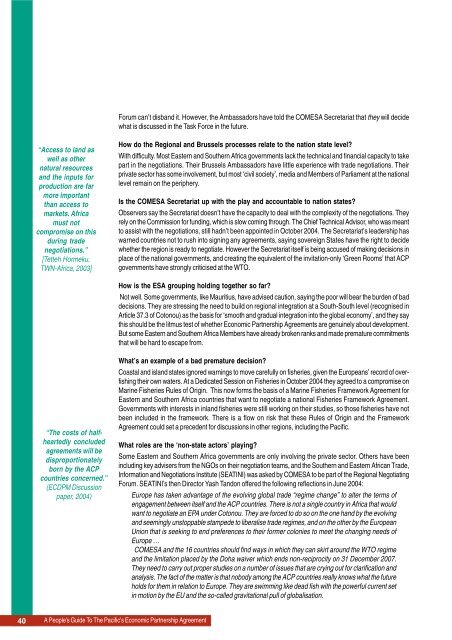REPA Booklet - Stop Epa
REPA Booklet - Stop Epa
REPA Booklet - Stop Epa
You also want an ePaper? Increase the reach of your titles
YUMPU automatically turns print PDFs into web optimized ePapers that Google loves.
Forum can’t disband it. However, the Ambassadors have told the COMESA Secretariat that they will decide<br />
what is discussed in the Task Force in the future.<br />
“Access to land as<br />
well as other<br />
natural resources<br />
and the inputs for<br />
production are far<br />
more important<br />
than access to<br />
markets. Africa<br />
must not<br />
compromise on this<br />
during trade<br />
negotiations.”<br />
[Tetteh Hormeku,<br />
TWN-Africa, 2003]<br />
How do the Regional and Brussels processes relate to the nation state level?<br />
With difficulty. Most Eastern and Southern Africa governments lack the technical and financial capacity to take<br />
part in the negotiations. Their Brussels Ambassadors have little experience with trade negotiations. Their<br />
private sector has some involvement, but most ‘civil society’, media and Members of Parliament at the national<br />
level remain on the periphery.<br />
Is the COMESA Secretariat up with the play and accountable to nation states?<br />
Observers say the Secretariat doesn’t have the capacity to deal with the complexity of the negotiations. They<br />
rely on the Commission for funding, which is slow coming through. The Chief Technical Advisor, who was meant<br />
to assist with the negotiations, still hadn’t been appointed in October 2004. The Secretariat’s leadership has<br />
warned countries not to rush into signing any agreements, saying sovereign States have the right to decide<br />
whether the region is ready to negotiate. However the Secretariat itself is being accused of making decisions in<br />
place of the national governments, and creating the equivalent of the invitation-only ‘Green Rooms’ that ACP<br />
governments have strongly criticised at the WTO.<br />
How is the ESA grouping holding together so far?<br />
Not well. Some governments, like Mauritius, have advised caution, saying the poor will bear the burden of bad<br />
decisions. They are stressing the need to build on regional integration at a South-South level (recognised in<br />
Article 37.3 of Cotonou) as the basis for ‘smooth and gradual integration into the global economy’, and they say<br />
this should be the litmus test of whether Economic Partnership Agreements are genuinely about development.<br />
But some Eastern and Southern Africa Members have already broken ranks and made premature commitments<br />
that will be hard to escape from.<br />
“The costs of halfheartedly<br />
concluded<br />
agreements will be<br />
disproportionately<br />
born by the ACP<br />
countries concerned.”<br />
(ECDPM Discussion<br />
paper, 2004)<br />
What’s an example of a bad premature decision?<br />
Coastal and island states ignored warnings to move carefully on fisheries, given the Europeans’ record of overfishing<br />
their own waters. At a Dedicated Session on Fisheries in October 2004 they agreed to a compromise on<br />
Marine Fisheries Rules of Origin. This now forms the basis of a Marine Fisheries Framework Agreement for<br />
Eastern and Southern Africa countries that want to negotiate a national Fisheries Framework Agreement.<br />
Governments with interests in inland fisheries were still working on their studies, so those fisheries have not<br />
been included in the framework. There is a flow on risk that these Rules of Origin and the Framework<br />
Agreement could set a precedent for discussions in other regions, including the Pacific.<br />
What roles are the ‘non-state actors’ playing?<br />
Some Eastern and Southern Africa governments are only involving the private sector. Others have been<br />
including key advisers from the NGOs on their negotiation teams, and the Southern and Eastern African Trade,<br />
Information and Negotiations Institute (SEATINI) was asked by COMESA to be part of the Regional Negotiating<br />
Forum. SEATINI’s then Director Yash Tandon offered the following reflections in June 2004:<br />
Europe has taken advantage of the evolving global trade “regime change” to alter the terms of<br />
engagement between itself and the ACP countries. There is not a single country in Africa that would<br />
want to negotiate an EPA under Cotonou. They are forced to do so on the one hand by the evolving<br />
and seemingly unstoppable stampede to liberalise trade regimes, and on the other by the European<br />
Union that is seeking to end preferences to their former colonies to meet the changing needs of<br />
Europe …<br />
COMESA and the 16 countries should find ways in which they can skirt around the WTO regime<br />
and the limitation placed by the Doha waiver which ends non-reciprocity on 31 December 2007.<br />
They need to carry out proper studies on a number of issues that are crying out for clarification and<br />
analysis. The fact of the matter is that nobody among the ACP countries really knows what the future<br />
holds for them in relation to Europe. They are swimming like dead fish with the powerful current set<br />
in motion by the EU and the so-called gravitational pull of globalisation.<br />
40<br />
A People’s Guide To The Pacific’s Economic Partnership Agreement
















